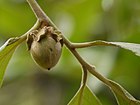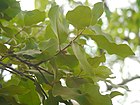Note: This is a project under development. The articles on this wiki are just being initiated and broadly incomplete. You can Help creating new pages.
Diospyros melanoxylon
Diospyros melanoxylon is a medium-sized tree or shrub that can be deciduous in drier localities and evergreen in moister ones. It can grow up to 25 metres tall. The bole can be 60cm in diameter.Mental disorders
Contents
- 1 Uses
- 2 Parts Used
- 3 Chemical Composition
- 4 Common names
- 5 Properties
- 6 Habit
- 7 Identification
- 8 List of Ayurvedic medicine in which the herb is used
- 9 Where to get the saplings
- 10 Mode of Propagation
- 11 Cultvation Details
- 12 Commonly seen growing in areas
- 13 Photo Gallery
- 14 References
- 15 External Links
Uses
Mental disorders, Nervous breakdowns, Palpitations of the heart, Urinary diseases, Blood diseases, Skin diseases, Diarrhoea.
Food
Diospyros melanoxylon can be used in Food. Ripe fruits are eaten raw[1].
Parts Used
Chemical Composition
Common names
| Language | Common name |
|---|---|
| Kannada | |
| Hindi | |
| Malayalam | |
| Tamil | |
| Telugu | |
| Marathi | |
| Gujarathi | |
| Punjabi | |
| Kashmiri | |
| Sanskrit | |
| English |
Properties
Reference: Dravya - Substance, Rasa - Taste, Guna - Qualities, Veerya - Potency, Vipaka - Post-digesion effect, Karma - Pharmacological activity, Prabhava - Therepeutics.
Dravya
Rasa
Guna
Veerya
Vipaka
Karma
Prabhava
Nutritional components
Diospyros melanoxylon Contains the Following nutritional components like - Vitamin-C; Calcium, Iron, Manganese, Magnesium, Phosphorus, Potassium, Sodium[1].
Habit
Identification
Leaf
| Kind | Shape | Feature |
|---|---|---|
Flower
| Type | Size | Color and composition | Stamen | More information |
|---|---|---|---|---|
| {{{5}}} |
Fruit
| Type | Size | Mass | Appearance | Seeds | More information |
|---|---|---|---|---|---|
Other features
List of Ayurvedic medicine in which the herb is used
Where to get the saplings
Mode of Propagation
Cultvation Details
A plant of the lowland tropics, where it is found at elevations up to 900 metres[4]. Diospyros melanoxylon is available through February-April[1].
Commonly seen growing in areas
Dry deciduous forest, Tectona grandis forests, Mixed forests.
Photo Gallery
References
- ↑ 1.0 1.1 1.2 "Forest food for Northern region of Western Ghats" by Dr. Mandar N. Datar and Dr. Anuradha S. Upadhye, Page No.69, Published by Maharashtra Association for the Cultivation of Science (MACS) Agharkar Research Institute, Gopal Ganesh Agarkar Road, Pune
- ↑ [Chemistry]
- ↑ [Morphology]
- ↑ Cultivation
External Links
- Ayurvedic Herbs known to be helpful to treat Mental disorders
- Ayurvedic Herbs known to be helpful to treat Nervous breakdowns
- Ayurvedic Herbs known to be helpful to treat Palpitations of the heart
- Ayurvedic Herbs known to be helpful to treat Urinary diseases
- Ayurvedic Herbs known to be helpful to treat Blood diseases
- Ayurvedic Herbs known to be helpful to treat Skin diseases
- Ayurvedic Herbs known to be helpful to treat Diarrhoea
- Herbs with Fruits used in medicine
- Habit - Evergreen tree
- Index of Plants which can be propagated by Seeds
- Herbs that are commonly seen in the region of Dry deciduous forest
- Herbs that are commonly seen in the region of Tectona grandis forests
- Herbs that are commonly seen in the region of Mixed forests
- Herbs
- Pages without herbs images



